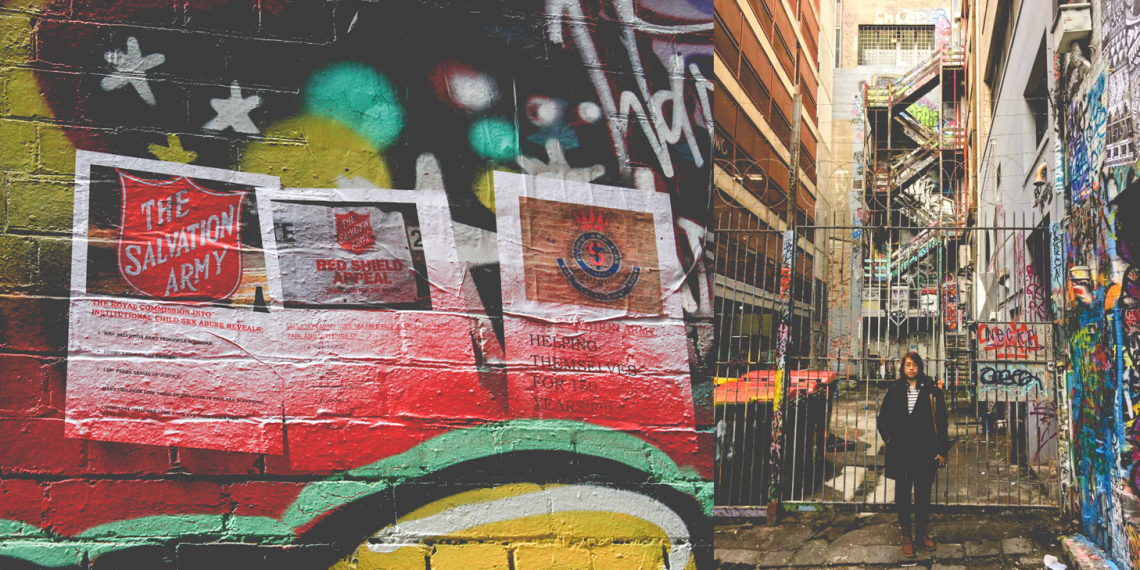The beautiful, mean streets of Melbourne

Debuting WM author Elizabeth Glass gets beyond the visually stunning sights of Melbourne to see the hidden lives that need our deep and abiding love on the streets.
I recently spent 10 days in the beautiful city of Melbourne. About half of those days, I found myself wandering the streets of the city.
The buildings were made up of the most magnificent architecture - the historical sites of the cathedral, the state library and the old bridges (dating back to 1889!) sat alongside the giant, modern, sleek buildings - their whole topmost floors made of gold, the sunlight reflecting gloriously off all 89 floors.
Melbourne is bursting full of culture, art and people – and all these vibrant and expressive streets make up a beautiful city.
The layout of Melbourne’s roads mean you chance upon cultural lanes and arcades that seem like whole different worlds filled with street art, cafes and little Victorian walkways with high domed ceilings.
Here, important-looking people in suits scurry around (accompanied by an indecent number of Bluetooth headsets) while the rest are obviously tourists taking in the sights or locals enjoying the walk at a leisurely pace.
Some things aren’t as easy to see at first in the creative surrounds.
Like the rubbish heaped on the side of the street or the dumpsters lined up in an alley.
Like the man with the dog, the unkempt hair and the ragged clothes moving farther into the shadows as people ignore him or cast shifty, distasteful glances his way. Or like the cutest little alley lined with cafes where, right at the end, a corner has a 2 meter square cut into the wall. Peering out of it is a girl not more than 25 years old, with the same disheveled air as the man and his dog.
Like the couple huddled by the entrance of a huge mall, their belongings covered in blankets and sheets. They had obviously been sleeping outside for a while.
For these people, these were not vibrant and expressive streets that made up a beautiful city, but terrible and lonely realities that reminded them they had no home.
Later in my trip, I spent some time catching up with a friend I hadn’t seen in ages. I had been looking forward to this. And as we shared, speaking about the triumphs and difficulties we each had faced over the years, a sight caught my eye mid conversation.
A man walked up to the seat next to us and looked around it for a while. There was a McDonald's bag sitting abandoned on the seat. He reached in to the paper bag and pulled out a nugget box, shook it - and finding that there were contents remaining inside, he put it in the bag he was wheeling around and proceeded to wander off again.
This shocked me.
The kind of shock that does something deep inside your spirit.
Homelessness does not exist in a vacuum. Mental health, family situations, breakdown of home, work life and support structures can all be contributing factors to someone living rough on the streets. Drug use is a pervasive problem among the homeless community, whether used prior or as a means of coping with the incredibly harsh conditions inherent in having no home.
But too often these factors seem like far off statistics, or systemic justifications for our own inaction... or ways to place blame at the feet of the person whose shoes are so desperately beyond repair that we wouldn't dream of wearing them in the first place.
There must be something we can do to help our community.
These are our brothers and sisters eating food they found chucked away on a park bench. These are our mothers and fathers covering their belongings with plastic and going without shelter for night after night after night. These are our sons and daughters being ignored and scorned, injected and rejected, afraid and alone on the streets.
We can’t fight everything. Each of us only has so much resources, time and energy.
But each of us can pick our fights.
- What are you passionate about?
- Where in the community are you committed to making things better?
- Who are the people who need you help?
- How can you make a change?
- What are you prepared to give?
These are the things I ask myself all the time, even in conversations with friends. Some of them have chosen to fight for justice in the legal system. Some have chosen to fight injustice overseas with education and funding. Others choose to fight for freedom of speech and equality in their country.
I want us all to find a way to help change the world and communities around us, no matter how little and humble the beginnings.
What does making that change look like for you?
Is it putting that spare change in the cup or buying the starving man a $3 sandwich, without judgement? Is it sitting beside that person who looks lost and alone in a public space? Is it creating better content for children's ministries or getting rid of single-use plastic bags in the supermarkets or providing safe spaces for people who are struggling with their bodies or sexualities or faith?
Whatever it is – get close to it.
That kind of passion begins with proximity.
If you want to find your passion and develop your ability to make justice happen around you, consider these simple steps:
- Get informed: Find information online and read articles about your area of justice. Where can you find the information you need?
- Get mentored: Find someone who knows more in the area of your passion, and ask them how you can help. Try reaching out online. Who do you know who is passionate about this?
- Get connected: Look for companies who are committed to fighting the injustice you see, and look at donating money or volunteering. How can I use my time and money to further this cause?
- Get talking: Creating awareness is one of the first steps in reaching out and rallying others like you to help as well. How can I engage others in meaningful, transformative conversation?
Then we will begin to see the vibrancy and expressive nature of the Kingdom of God - the way our Father really wants the world to be - begin to colour our streets and faces and lives.
And that will be a city worth celebrating.
By Elizabeth Glass
WM Author
